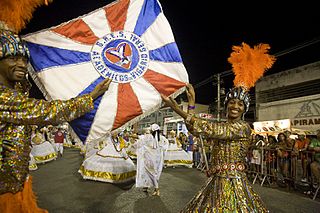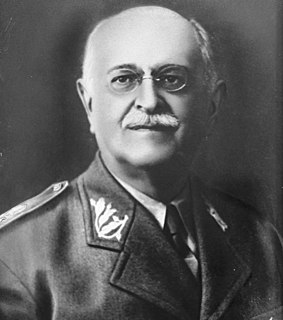
The politics of Brazil take place in a framework of a federal presidential representative democratic republic, whereby the President is both head of state and head of government, and of a multi-party system. The political and administrative organization of Brazil comprises the federal government, the 26 states and a federal district, and the municipalities.

Samba, also known as samba urbano carioca or simply samba carioca is a Brazilian music genre that originated in the Afro-Brazilian communities of Rio de Janeiro in the early 20th century. Having its roots in Brazilian folk traditions, especially those linked to the primitive rural samba of the colonial and imperial periods, is considered one of the most important cultural phenomena in Brazil and one of the country symbols. Present in the Portuguese language at least since the 19th century, the word "samba" was originally used to designate a "popular dance". Over time, its meaning has been extended to a "batuque-like circle dance", a dance style, and also to a "music genre". This process of establishing itself as a musical genre began in the 1910s and it had its inaugural landmark in the song "Pelo Telefone", launched in 1917. Despite being identified by its creators, the public, and the Brazilian music industry as "samba", this pioneering style was much more connected from the rhythmic and instrumental point of view to maxixe than to samba itself.

The Fourth Brazilian Republic is the period of Brazilian history between 1946 and 1964 also known as the "Republic of 46" or as the "Populist Republic". It was marked by political instability and military's pressure on civilian politicians which ended with the 1964 Brazilian coup d'état and establishment of Brazilian military government.
In Brazil, the mayor is the chief executive of the smallest territorial unit — the municipality — and holds executive powers of the local government, in a "strong mayor-council" arrangement. In Portuguese, the mayor is called the prefeito or prefeita, while the government itself is termed the prefeitura.

Mozart Camargo Guarnieri was a Brazilian composer.

Radamés Gnattali was a Brazilian composer of both classical and popular music, as well as a conductor, orchestrator, and arranger.

Fafá de Belém, born Maria de Fátima Palha de Figueiredo in Belém do Pará on August 9, 1956, is a Brazilian singer considered one of the great female singers of MPB. She took her stage name from the city of her birth and in addition to a successful recording career that spans over three decades, it is fair to say that she has been one of the great sex symbols of Brazilian pop music. Her husky mezzo-soprano voice is known for its extensive emotional range, from tender ballads, to sensual love songs, to Portuguese fados all the way to energetic sambas and lambadas.

Mário Rodrigues Filho, better known as Mário Filho was a Brazilian journalist and writer.

Cinelândia is the popular name of a major public square in the centre of Rio de Janeiro, Brazil. Its official name is Praça Floriano Peixoto, in honour of the second president of Brazil, Floriano Peixoto.

Marcelo Bezerra Crivella is a Brazilian Evangelical pastor, gospel singer and politician. He served as the Mayor of the city of Rio de Janeiro from January 1, 2017 until December 31, 2020. In the 2020 election, Crivella ran for a second term but lost to Eduardo Paes in each of the city's 49 constituencies.
Denise Frossard Loschi is a judge and politician from Brazil. She studied law and served as a magistrate in Rio de Janeiro. She has been a law professor at the Getúlio Vargas Foundation. When she retired she started working for Transparency International.

General elections were held in Brazil on 3 October 1950. The presidential elections were won by Getúlio Vargas of the Brazilian Labour Party, whilst the Social Democratic Party remained the largest party in both the Chamber of Deputies and the Senate, although they lost their majority in the former. Voter turnout was 72.1% in the presidential election, 72.0% in the Chamber elections and 77.7% in the Senate elections.

Getúlio Dornelles "Gegè" Vargas, also known by his initials GV and nicknamed "the Father of the Poor", was a Brazilian lawyer and politician who served as the 14th and 17th president of Brazil, from 1930 to 1945 and from 1951 to 1954. He was born in São Borja, Rio Grande do Sul to a powerful local family, embarking on a quick military career before graduating from law school. He began his political career began as district attorney, soon becoming a state deputy prior to a short interim period. His return as a state legislator ended when he entered national politics, serving as member of the Chamber of Deputies and Minister of Finance before departing to head Rio Grande do Sul as state president.
The history of the socialist movement in Brazil is generally thought to trace back to the first half of the 19th century. There are documents evidencing the diffusion of socialist ideas since then, but these were individual initiatives with no ability to form groups with actual political activism.
The following is a timeline of the history of the city of Rio de Janeiro, Brazil.

Between 24 October and 3 November 1930, a provisional military junta governed Brazil from the ousting of President Washington Luís to the installation of Getúlio Vargas as his replacement at the end of the Revolution of 1930.

Events in the year 1943 in Brazil.

The Communist uprising of 1935 was a military revolt led by Luís Carlos Prestes and leftist low-rank military against Getúlio Vargas's government on behalf of the National Liberation Alliance. Supported by the Brazilian Communist Party (PCB), then called the Communist Party of Brazil, and the Comintern it was the last of a series of Brazilian military uprisings which began on 1922 under the name of tenentismo or the lieutenants revolts.

Benedito Gomes Barbosa Junior, better known as "Bene Barbosa", is a Brazilian public security activist and specialist. He is also president of the NGO Viva Brazil Movement.















